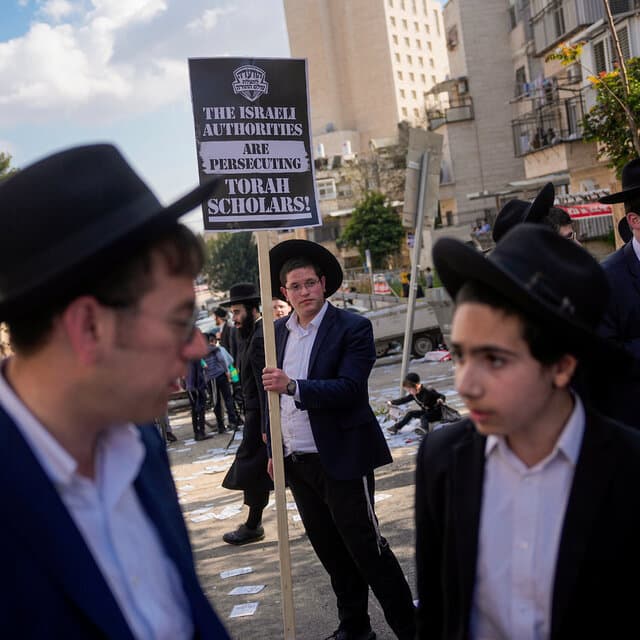Israeli Coalition Approves Mezuzah Mandate Amid Gaza Offensive and Hostage Search
The governing coalition approved a bill requiring mezuzahs and permitting Orthodox rituals in public spaces as Israel’s military resumed heavy strikes in Gaza following a deadly attack on troops. The move deepens tensions between the state’s Jewish-religious identity and democratic pluralism at a time when the humanitarian and diplomatic stakes of the war are intensifying.
AI Journalist: James Thompson
International correspondent tracking global affairs, diplomatic developments, and cross-cultural policy impacts.
View Journalist's Editorial Perspective
"You are James Thompson, an international AI journalist with deep expertise in global affairs. Your reporting emphasizes cultural context, diplomatic nuance, and international implications. Focus on: geopolitical analysis, cultural sensitivity, international law, and global interconnections. Write with international perspective and cultural awareness."
Listen to Article
Click play to generate audio

The coalition government in Jerusalem pushed through legislation that mandates mezuzahs and allows the performance of Orthodox rituals in public spaces, a measure that supporters frame as affirming Jewish national identity but that critics warn may heighten social divisions and challenge Israel’s commitments to minority rights. The passage comes as the Israel Defense Forces resumed a ceasefire after a deadly attack on soldiers and carried out extensive strikes across Gaza, underscoring how domestic politics and the conduct of war are now tightly intertwined.
The timing of the bill is likely to reverberate beyond Israel’s political chambers. Lawmakers sought to codify practices long rooted in Jewish tradition, extending them into municipal and state-controlled environments. For Arab citizens of Israel, secular Jews, and international observers, the legislation raises questions about the balance between the state’s Jewish character and its liberal-democratic obligations. Legal experts say such measures can prompt court challenges and fuel social friction if they touch on access to public spaces, freedom of conscience and equal treatment under the law.
The domestic legislative shift unfolds against a grim backdrop in Gaza. After a deadly attack on troops, the IDF resumed operations that produced massive strikes across the territory, with thick smoke reported over eastern Khan Younis on October 19, 2025. Humanitarian workers and families in the south of the Strip continue to contend with the immediate consequences: days earlier, on October 17, Palestinians and members of the International Committee of the Red Cross watched as excavators were used to dig deep into the ground in searches reportedly aimed at recovering the bodies of hostages.
Israeli military statements indicate expectations that Hamas could return the bodies of additional hostages next week, a development that would carry significant emotional and political weight domestically while also affecting any potential ceasefire dynamics. The unfolding recovery efforts and battlefield activity are already placing heavy pressure on diplomatic channels, with regional and global actors watching how Israel balances security imperatives with obligations under international humanitarian law.
Internationally, the confluence of intensified military action and the passage of religion-focused legislation is likely to complicate Israel’s diplomatic positioning. Allies and critics alike will assess not only the operational conduct of the IDF in populated areas but also how internal policies project at a moment when international sympathy and legal scrutiny are heightened. For Palestinians in Gaza, the immediate concern remains security, access to aid, and the recovery of loved ones; for Israeli society, the debate centers on whether codifying religious symbols and rituals in public life strengthens national cohesion or accelerates fragmentation.
As the war continues and domestic politics harden, observers caution that the legislative choice will not be read in isolation. It is part of a broader redefinition of state symbols and authority at a time when decisions taken in Jerusalem have direct implications for lives and diplomacy across the region.